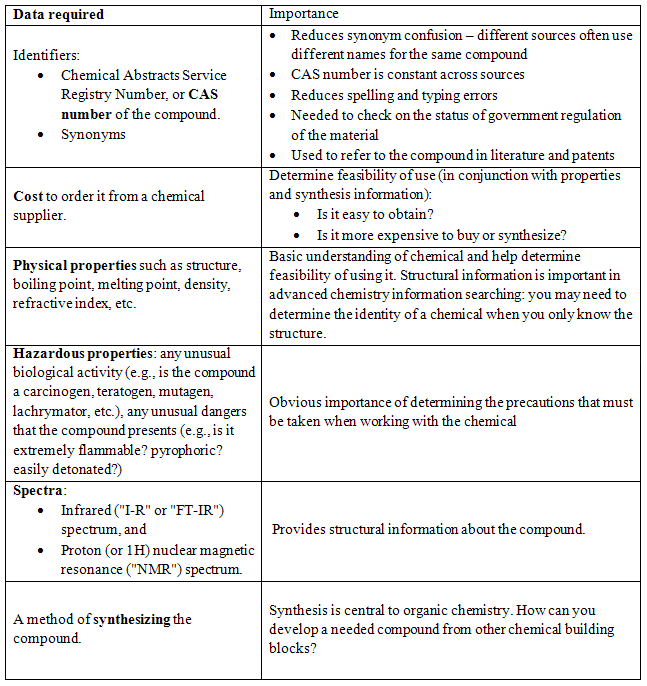Experiment 1 - Literature Searching
Objective
-
•understand the benefit of doing research before working in the lab
-
•learn how to find professional chemistry information
Introduction
Organic chemistry boasts an incredibly long and fruitful research history. The results of experiments done more than a century ago—or even as recently as last week—are still highly relevant to modern chemists, and often this information is easily found online once one knows where and how to search. Specialized chemistry databases, reference books, and websites have been developed to help you sort through this enormous storehouse of chemistry information. Part of one's chemistry education is learning how to use these powerful tools effectively. Doing some preliminary research can save you time and money. You may uncover a method of synthesis developed on another continent 150 years ago that still turns out to be the simplest, most cost-effective way to obtain a needed chemical. Or, it may turn out that simply buying a needed reagent online is the best course of action. More importantly, doing your research ensures that you understand any important safety precautions necessary when working with particular chemicals. These days, the majority of chemical information is available online. Even many decades-old journal publications have been digitized. This does not mean that it is easily Googled or otherwise available for free. Most information is available to researchers only through a university or corporate library, because, like any valuable business information, it requires paid subscription access. But it does mean that in many cases you can complete all of your research work from any computer.Procedure
You will pick a compound to research from the list at the end of this chapter. Starting only with the name, you will try to find all pertinent data, listed in the table below. All of this information would be important if you were to use the compound. The remainder of this chapter discusses how chemistry information is produced, why each of these pieces of information are necessary, and how to find them.
Be sure to cite all sources of information.
Go to http://go.ncsu.edu/ch224 for links to all recommended sources and details on using them.
About Chemistry Information - Journals
Dr. Blake, a chemistry researcher, conducts an experiment and learns about a new way synthesize benzoyl peroxide (a familiar substance in acne medications) from a particular base chemical using a procedure never before documented. How does she report her findings? New findings, procedures, useful reactions, and other important chemistry findings are ultimately published in scholarly journals. Journals are similar to magazines: they are published periodically (e.g., every week, or every month) and contain articles. But unlike popular magazines, the articles are written by researchers, for researchers. These articles are usually very specific (perhaps on a specific reaction rather than a sweeping account of how chemical reactions work—that is the domain of entire books). A reader not familiar with the field of study would have difficulty understanding the content. The whole point is to convey information to the research community. Once published, the information is available to all other researchers in perpetuity, and further, authors get credit for their discoveries. (Many researchers are required to publish their findings regularly as part of their jobs!)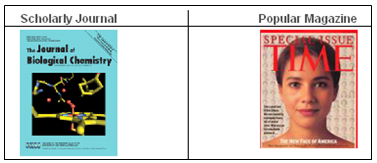
Figure 1
-
•Nature (publishes articles in all scientific fields, but widely considered to be the most prestigious science journal)
-
•Journal of the American Chemical Society (JACS)
-
•Journal of Organic Chemistry (JOC)
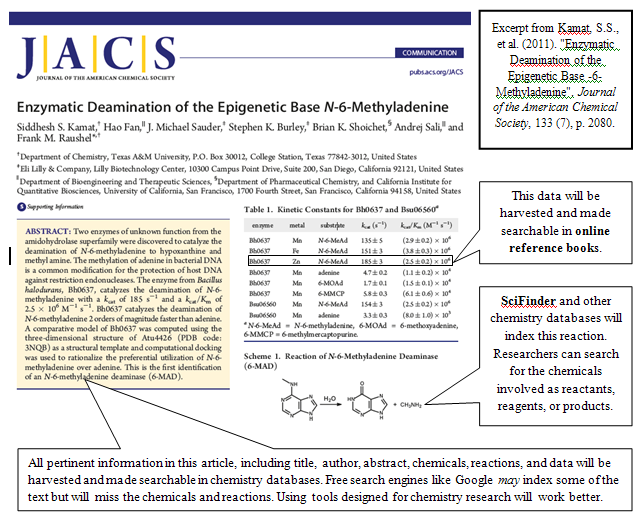
Figure 2
About Chemistry Information - Chemical Abstracts
One problem with journal literature is that there is a lot of it. It's cumbersome for researchers to dig through if they just want one piece of data. To relieve this problem, the American Chemical Society (ACS) began indexing chemistry literature through its Chemical Abstracts Service (CAS) in 1907, and began publication of the Chemical Abstracts. While Chemical Abstracts are still available in enormous printed volumes (researchers used to thumb through these printed indexes to find articles), they are now searchable through the SciFinder database. Chemists have numerous reasons to use SciFinder and not Google for chemistry research. The information in SciFinder is logically organized for chemistry. Plus one can search for structures and reactions. Each compound indexed by CAS is assigned a Chemical Abstracts Service Registry Number (or, CAS number) which uniquely designates that compound. These numbers are vital when searching. A compound could have dozens of common names (and a given source may not list the name you are familiar with) but it will only have one unique CAS number recognized in nearly all sources. They have been widely adopted by regulatory agencies such as the EPA to unambiguously designate compounds.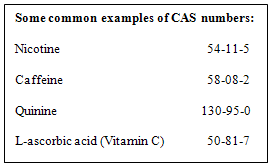
Figure 3
About Chemistry Information - Reference Material
Researchers often just need portions of published articles. They don't need all the details, but might be interested in the physical property data, reactions, or spectra. As a result, numerous secondary sources of chemical literature are available. You will use these sources for much of the literature searching assignment. These might take the form of chemical encyclopedias that compile physical data (such as the handy Merck Index or the CRC Handbook of Chemistry and Physics), usually available both in print and online. Here is an excerpt of the kind of information you might see in the Merck Index: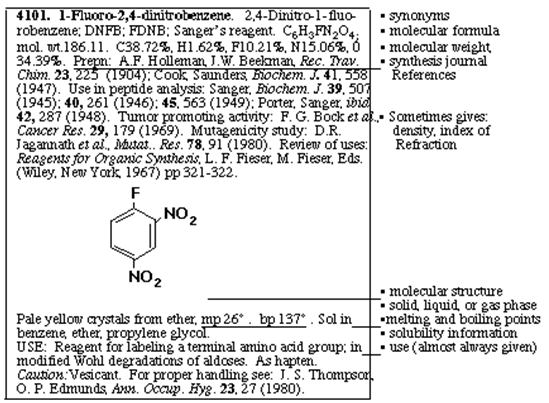
Figure 4
Finding Chemistry Information
So where do you look for all of this information? Where can you find good chemistry databases and how do you use them? Can you just use Wikipedia or Google? The answer to all of these questions is: "It depends..." The field of chemistry is somewhat unusual in that researchers might choose different sources depending on the type of information needed. Physical properties, spectra, and methods of synthesis might be found in entirely different sources. Also, the sources that were helpful for one compound may not have any information for others. Even further, some basic information for common chemicals is indeed easy to find through a quick online search—but do not make the mistake of thinking this will always work. Learning to do chemical research means getting familiar with the process of finding information more than the individual sources.
Go to http://go.ncsu.edu/ch224 for links to all recommended sources and details on using them.
Could I just use Wikipedia or Google to do this?
Wikipedia and Google are probably the first places you turn for most day-to-day information, but it's a different story when it comes to professional research. You might find what you need, especially if you just want some basic physical properties, and even more especially for common compounds in widespread use. (For example, look up benzene or nitric acid. There is no shortage of information.) But you also might find yourself swimming in chemical company websites or anonymous blogs, or trying dozens of fruitless searches, or trying to piece together bits and pieces of information, or finding nothing at all. You'll avoid wasting time if you use tools designed for chemistry research. Think of a similar example: let's say you wanted some coffee. Would you go to a sprawling shopping mall or a small coffee shop right next door? Sure, you're bound to find coffee in the mall if you search around long enough. Or you could just go right into the coffee shop and get what you want quickly. Specialized research tools are like that specialized coffee shop. They were designed with a specific purpose in mind.Do you need to visit the library in person to complete this assignment?
Probably not. The main sources for chemistry research are all accessible online. They generally require subscription access (though there are exceptions). The library website is your gateway to these campus subscriptions to electronic books, databases, and journals. That said, you might need to find an older article that isn't online. Or, you might find the print reference books useful for portions of your research. Thorough research in all fields uses a variety of sources, both online and in print.Tips on Finding Different Types of Chemical Information
The guide below suggests a starting point online for each portion of the lab report. All chemicals will be different: your information may be in the first place you look, or you may need to check several sources before you find what you need. All recommended sources are linked from http://go.ncsu.edu/ch224.Basic information - CAS number, synonyms, cost
This information should be readily available in multiple sources and easily found online. Get the CAS number first, gather synonyms as you encounter them. See the earlier discussion on CAS numbers—use these to search, instead of names, whenever possible.-
•Start with: the Sigma-Aldrich catalog online. Sigma-Aldrich is a chemical retailer and should provide some basics, including cost. Sigma and Aldrich are companies with a history of printing useful reference books, and most of this information has been synthesized into their site. Like Amazon for books, they are trying to sell something and will provide as much helpful information as they can to potential customers. Look for physical properties, safety information, and spectra while you're there.
Physical Properties
Physical property all recoinformation, such as molecular formula, boiling point, etc., might be available in hundreds of places if the chemical is simple, common, or useful. You should try to verify anything you find in Wikipedia or an unfamiliar source by checking multiple sources. You'll also find that a lot of this information is copied and pasted throughout hundreds of websites. It's important to understand that the availability of information will be different for every compound. Your colleague researching benzene might find every required physical property in the first source he checks. Meanwhile, you are trying to find a complex or rare chemical, and will have to look through four sources to find five different pieces of data, and you still won't find everything you want. You can't count on the goodness of Wikipedia users to compile information like this for you. This is where professional reference sources come in handy. They are quick to search and contain a wealth of data.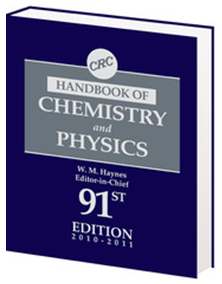
Figure 5
-
•Start with: CHEMnetBASE. This is an online compendium of notable chemistry reference books. Broad and reliable.
-
•Tried several sources and still can't find a particular property? Consider if there may be a logical reason why your chemical might not have information on a property. Like, does it explode when you heat it? That might make it difficult to establish a boiling point! Are the crystals too small to allow chemists to find a refractive index?
Hazardous properties
Hazard and safety information is usually easy to find. It's in everyone's best interest to make this information widely available, and standardize its format for easy reading.-
•Look for: an MSDS (Material Safety Data Sheet). Sigma-Aldrich might have one. Or try the NC State University MSDS Management System.
Spectra
Like physical properties, information for any particular chemical compound could be in a number of sources—you might find it the first place you look or the fourth. Unlike physical property information, you might struggle find this specialized information with a simple Google search. Use a good source of compiled spectra rather than a broad internet search and save time.-
•Try: Sigma-Aldrich has incorporated many of their spectral atlases into their website. Another good source is AIST's SDBS website, which they offer free online.
Synthesis
Finding syntheses is a central task in organic chemistry. For simple, common chemicals, numerous synthesis methods have already been discovered. You wouldn't want to spend costly time in the lab developing a new method until you knew what was already out there. The good news is that there are some really great tools for this task. The bad news is that they require a bit of effort to learn how to use them. Two outstanding databases for this task are Reaxys or SciFinder. Either works, both have a learning curve. (Chemistry majors will find these more and more useful in later classes or when doing research and should definitely take the time to try one or both out.) Reaxys does not require a user account and synthesis results are easy to find, so it is recommended.-
•See sources and instructions at http://go.ncsu.edu/ch224.
Some chemistry information trivia:
• The dominant language in chemistry for much of its history was German. English became the standard perhaps in the 1970s or 1980s. If you were a chemistry student up until that time, you would take some German courses as part of your required education.
• The dominant language in chemistry for much of its history was German. English became the standard perhaps in the 1970s or 1980s. If you were a chemistry student up until that time, you would take some German courses as part of your required education.

